Sports betting is everywhere. How do Americans feel about it?
KEY FINDINGS:
- In the wild west of sports gambling, the industry is growing with a very engaged and young group of Americans, new Ipsos polling shows.
- One in three Americans feel that sports betting is a way to get people more engaged with sports, but 69% of sports bettors feel the same.
- Most sports bettors are male, white, wealthy, and younger. They are also likely to be committed sports fans and most often bet on the NFL or the NBA.
- Still, very few people bet on sports. Only about 8% of Americans say they’ve bet on sports via an app or online and only 4% have bet on sports in-person in the past year.
- Non-betting Americans are skeptical of the practice or are just not tuning in at all. Many view gambling as an enterprise that should be allowed as a personal choice.
Sports betting has exploded following the 2018 U.S. Supreme Court decision that created a path for states to legalize betting on sports. Most states have legalized the practice since then, generating hundreds of billions in bets placed.
Revenue-wise, in the U.S. alone, sports betting generated over one billion dollars in 2020. The next year, that nearly quadrupled to $4.33 billion in revenue.
But the fast-moving and lucrative industry is not without its critics. Public health experts are increasingly concerned about gambling addiction, given the quick pace of legalization, the ease of mobile betting, and the staggering amounts of money at play.
With so much uncharted water and a fast-growing, moneymaking venture, insiders in the industry are paying attention. But is the public paying attention? Do they care?
In the wild west of sports gambling, the industry is growing with a very engaged and young group of Americans, new Ipsos polling shows. Non-betting Americans are skeptical of the practice or are just not tuning in at all. Though, many view gambling as an enterprise that should be allowed as a personal choice rather than an activity that should be outlawed because of fears of addiction.
Here is what you need to know about sports betting in the U.S.:
- Sports bettors are very engaged with the sporting world
- Sports bettors are more likely to be men, younger, and/or wealthy
- Americans aren’t totally sold on legalizing sports betting
- Non-bettors don’t engage because they feel it is a waste of money
- Most sports fans (and Americans in general) feel that people should be able to bet on sports as a matter of personal choice
1. Sports bettors are very engaged with the sporting world
Very few people bet on sports. Only about 8% of Americans say they’ve bet on sports via an app or online and only 4% have bet on sports in-person in the past year, meaning very few Americans generate the billions of dollars placed in bets and revenue generated.
As the dollar spent on bets suggests, those who do bet on sports are very engaged in the sporting world. While only one in three Americans feel that sports betting is a way to get people more engaged with sports, 69% of sports bettors feel the same. Compared to the general public, they are more likely to self-describe as sports fans, play fantasy sports, go to live sporting events, and watch more niche types of sports, like esports.
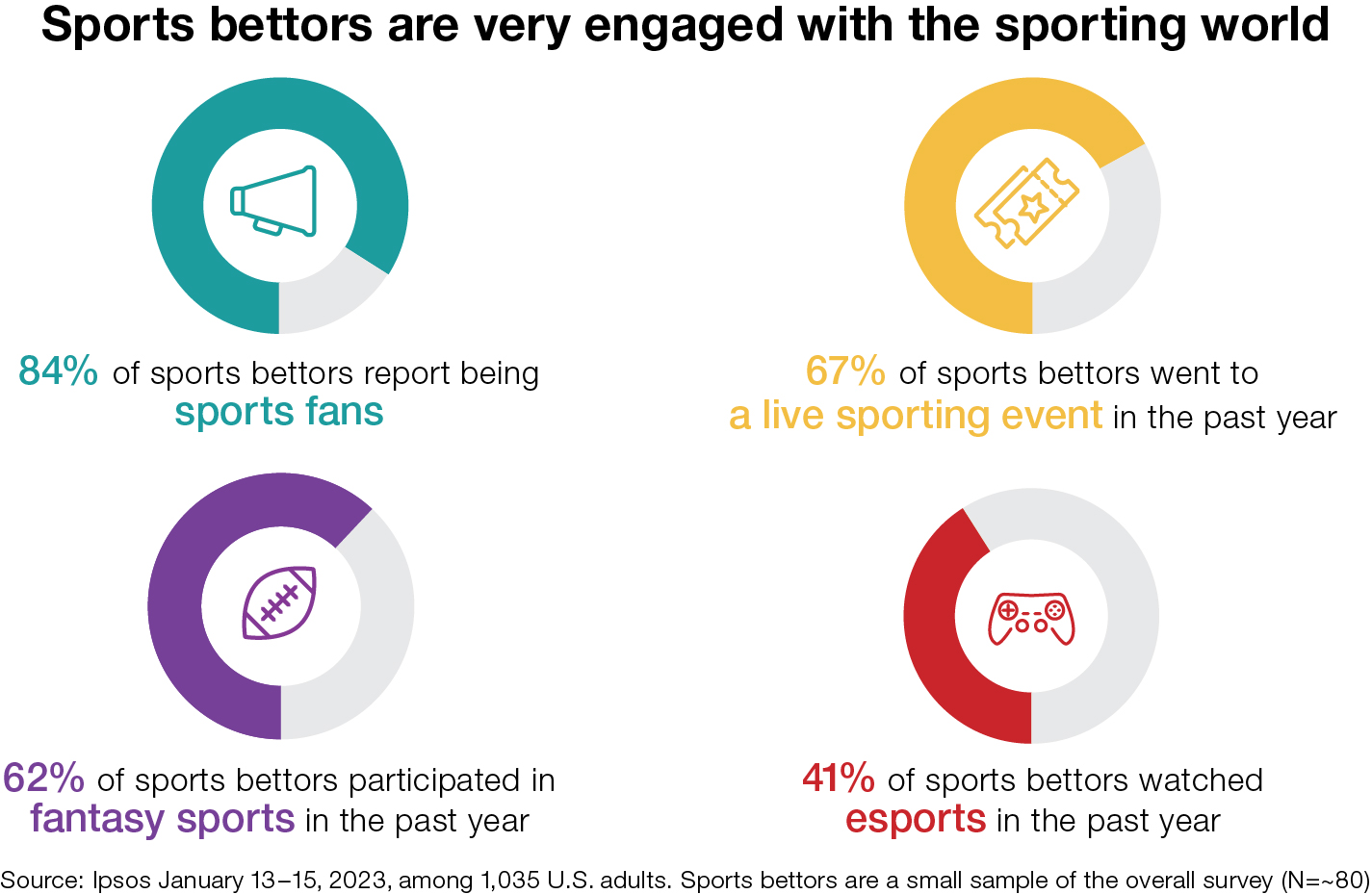
The NFL is the most popular sports league to bet on, the runaway favorite of the group. After that, NBA games follow, and then NCAA football or basketball are not far behind. Unsurprisingly, majorities of sports bettors tuned into the major sporting events last year, like the Super Bowl or March Madness.
Most sports bettors aren’t frequent bettors and will either place bets just a few times a year or have only bet on sports once, making high profile games, like the Super Bowl, important moments for the industry.
2. Sports bettors are more likely to be men, younger, and/or wealthy
According to Ipsos polling, sports bettors are more likely to be men, under the age of 35, white or high-income earners. Some of these demographics—particularly men and those under the age of 35—are known to be at a higher risk of gambling addiction.
Given the way the sports betting industry has taken off, this poses an area of concern for public health officials. For example, in New Jersey, calls to the state’s addiction hotline grew substantially after it became one of the first states to legalize sports betting in 2018. In 2018, about 5% of the hotline’s calls were about sports gambling. In 2022, sports gambling calls made up 25% of all calls.
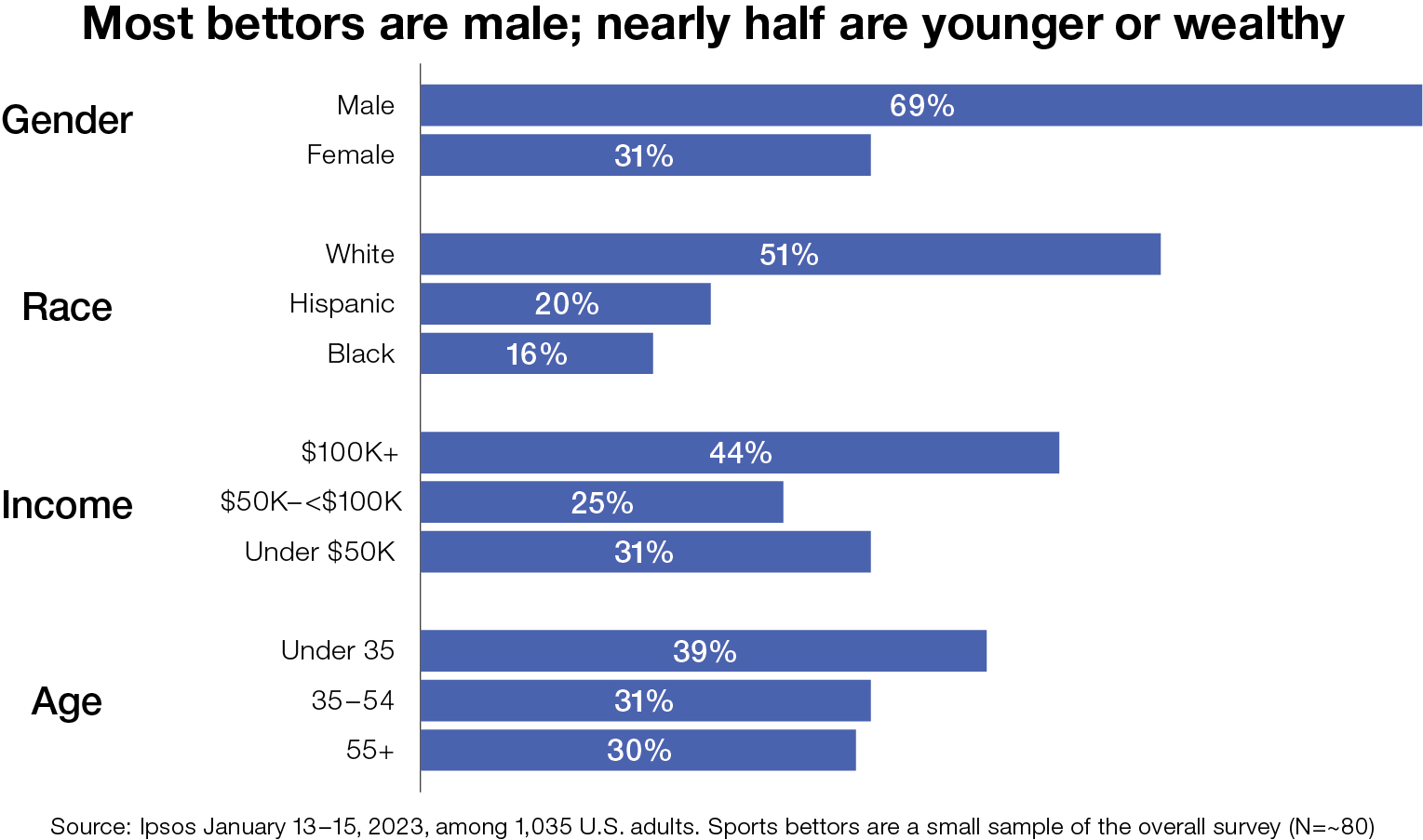
People who bet on sports are also more likely to report being sports fans because they grew up with family fandom. Three in five sports bettors (59%) say they are fans of sports team because “I grew up with my family being fans of that team.” Only 38% of non-sports bettors have that longstanding family connection to sports teams.
3. Americans aren’t totally sold on legalizing sports betting
For decision makers in the industry, online or app-based sports betting may not be a fan favorite outside of the sports world, but that’s in large part because many Americans aren’t tuned into this conversation.
And, while legalizing sports betting may be a pressing question for the industry, the general public is fairly ambivalent. Overall, only one in three Americans wants to allow in-person or app-based sports betting in their state, and another one in three don’t have an opinion. In fact, the only group not ambivalent about allowing sports betting seems to be the group actively doing it.
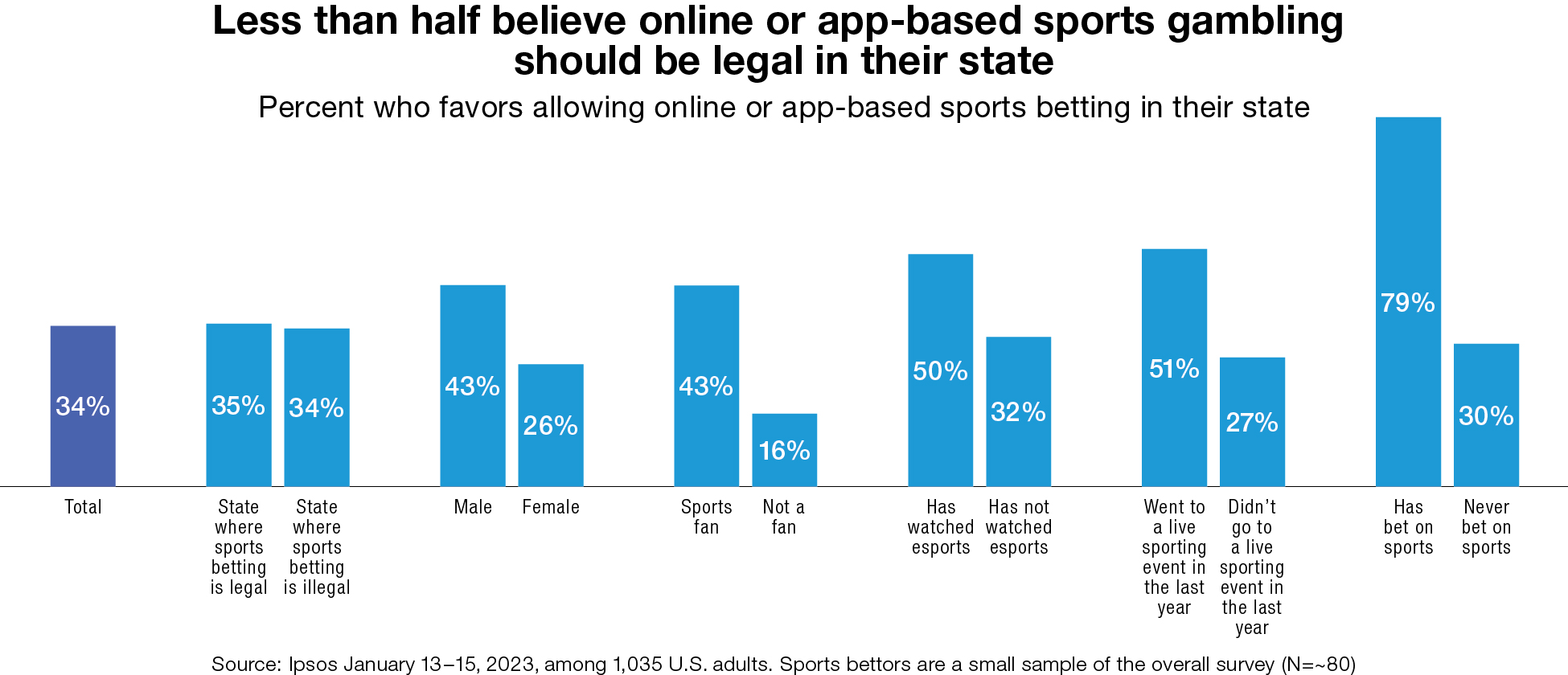
4. Non-bettors don’t engage because they feel it is a waste of money
People who don’t bet on sports don’t do so because of four broad reasons: money concerns, lack of knowledge, moral opposition, or it’s just illegal where they live.
Money is the main reason people do not bet on sports. When asked to select any and all reasons they do not bet on sports, half of the people who don’t bet on sports choose not to because they believe it is a waste of money. Non-bettors are also deterred from participating because they don’t know enough about sports or about betting to partake. Following that, there is some amount of moral opposition among the non-betting public; people either don’t believe in betting on sports or gambling in general, though this issue is secondary to money or not knowing enough.
While some segments of the population remain intractable, there are non-betting Americans who don’t partake because they just don’t know enough about gambling—a potential new group for the industry to expand into.
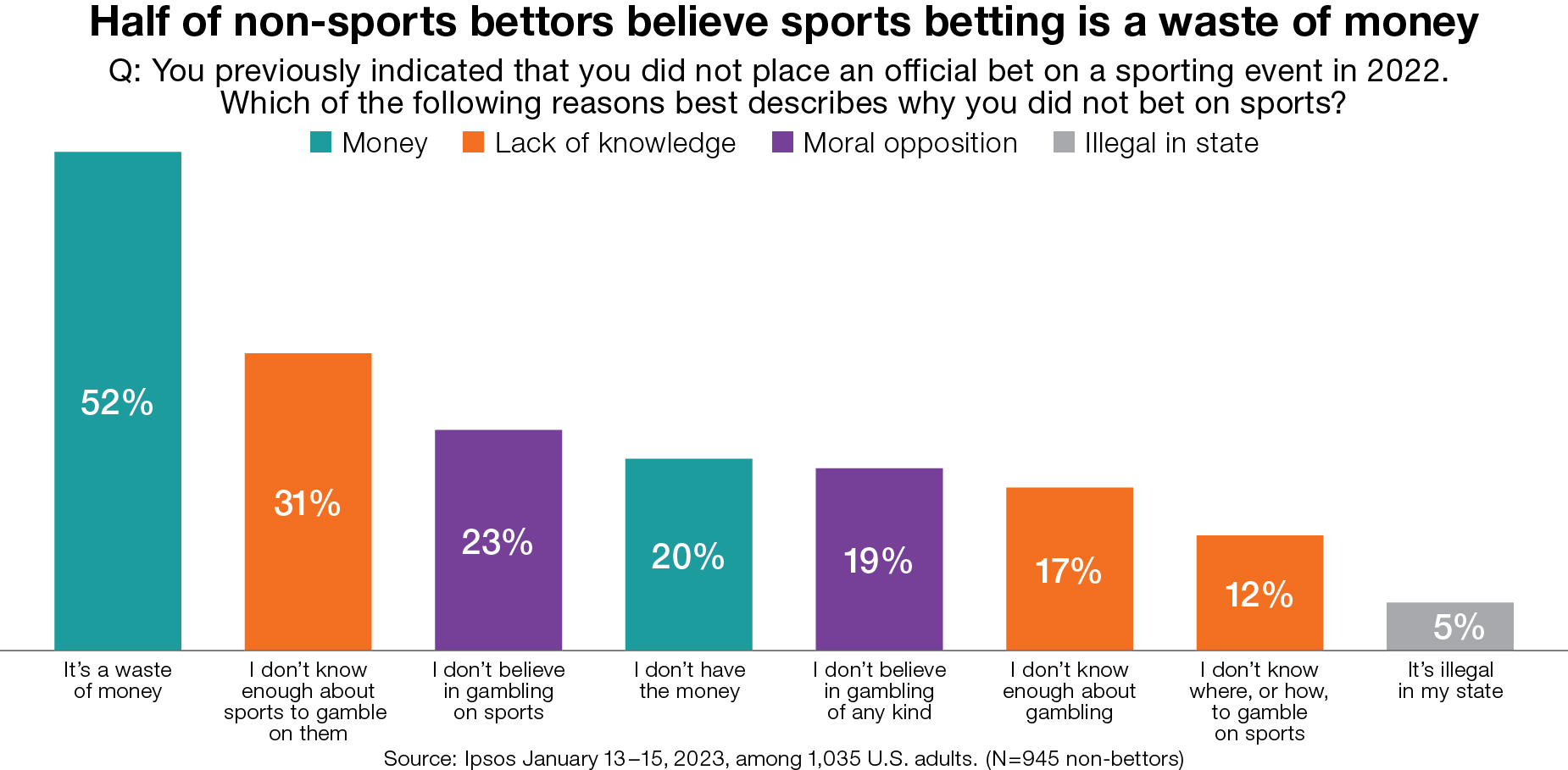
5. Most sports fans (and Americans in general) feel that people should be able to bet on sports as a matter of personal choice
Sports betting isn’t for everyone. But at the end of the day, most think that people should be allowed to use their money how they want.
Though some concerns about the integrity of the game linger, when given two options, more of the public thinks sports gambling is a personal choice that should be allowed rather than an activity that should be outlawed because it can lead to addiction.
Sports fans are much more likely to agree with this, suggesting that sports betting, as an industry and practice, doesn’t get in the way of enjoying the game for most fans.
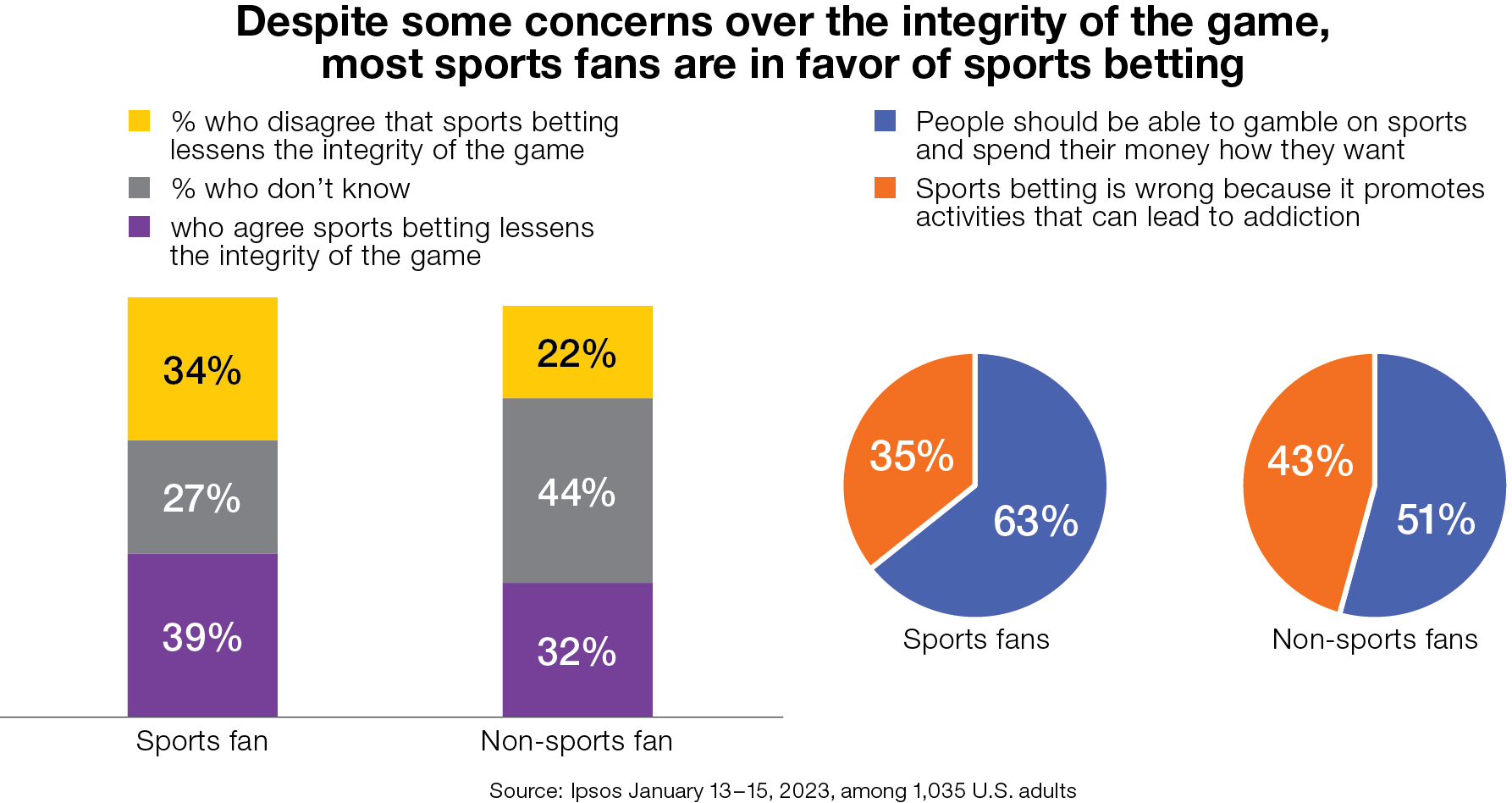
Even though the industry is new, early adopters of sports betting are an engaged but small group of Americans that are very clued into the world of sports. For the general public, though, sports betting isn’t a top-of-mind issue, with nearly even splits of Americans being pro-betting, anti-betting, or just not sure altogether. Even with this divide, sports betting is viewed by many, particularly sports bettors and sports fans, as an activity that should be allowed as a personal choice rather than banned over possible addiction concerns.




![[WEBINAR] The Value of Higher Education in the New America](/sites/default/files/styles/list_item_image/public/ct/event/2025-08/8.jpg?itok=3VxfEWu4)